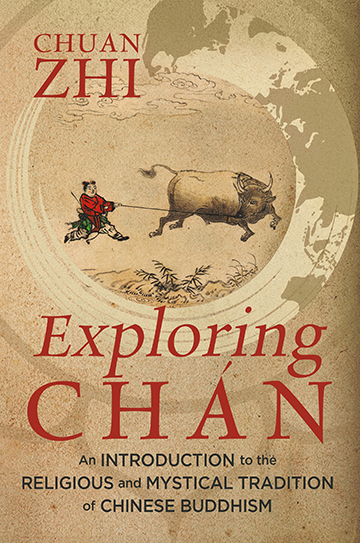Exploring Chán covers a broad spectrum of topics, from the origins of meditation to modern day practices, from Indian expressions of Buddhism, to Chinese, Korean, Tibetan, Japanese, and Western expressions. It delves into psychology, philosophy, ontology, psychology, and yes, physics (my formal educational background). It also presents practical approaches for practicing Chan. To read a review
Book Release: Exploring Chán: An Introduction to the Religious and Mystical Tradition of Chinese Buddhism
 Enthusiasts of our website or ZBOHY may be wondering where I've been for the last six years. I've been writing a book. Finally released, Exploring Chán covers a broad spectrum of topics, from the origins of meditation to modern day practices, from Indian expressions of Buddhism, to Chinese, Korean, Tibetan, Japanese, and Western expressions. It delves into psychology, philosophy, ontology, psychology, and yes, physics (my formal educational background). It also presents practical approaches for practicing Chan. To read a review, click here, to visit the book's website, click here, and to buy it on Amazon, click here (it's available at other booksellers as well).
Enthusiasts of our website or ZBOHY may be wondering where I've been for the last six years. I've been writing a book. Finally released, Exploring Chán covers a broad spectrum of topics, from the origins of meditation to modern day practices, from Indian expressions of Buddhism, to Chinese, Korean, Tibetan, Japanese, and Western expressions. It delves into psychology, philosophy, ontology, psychology, and yes, physics (my formal educational background). It also presents practical approaches for practicing Chan. To read a review, click here, to visit the book's website, click here, and to buy it on Amazon, click here (it's available at other booksellers as well).
A descriptions of the book (from the back cover) reads:
"Zen has influenced Western culture today in ways unimaginable when it was first introduced by Soen Shaku in 1893 at the World’s Parliament of Religions in Chicago. Insights from Zen’s extensive literary archives have benefited health care, psychology, psychiatry, and philosophy, while its trendiness has inspired countless discussions on social media forums and living room couches.
"But how does our everyday understanding of Zen align with the religious and ascetic practices which began some fifteen hundred years ago in China as Chán? How might we understand its genesis and purpose in sociological and spiritual contexts? Is it appropriate to differentiate Japanese Zen from Chinese Chán even though they share the same origins? And what does Chán training in contemporary life look like?
"Seeking answers to these questions, Chuan Zhi invites us to explore Chán’s origins and development through canonical texts, monastic traditions, and spiritual practices that span over five millennia. With the help of insights culled from contemporary scholars and historians, Chuan Zhi further examines how Chán’s development was influenced by social and political forces during the Tang and Song dynasties, and how it was modified further by Koreans and Japanese to accommodate their own indigenous folk religions, social customs, and political agendas. Finally, he describes contemporary approaches to Chán training and challenges sometimes encountered with its practice.
"Drawing on over three decades of study and practice, Chuan Zhi takes us on a fascinating journey to uncover the complex character of Chán. Throughout the narrative, he argues that Chán’s mystical practices are as valuable for life today as they have been for centuries."
The book has been fortunate to recieve some good reviews, including from Kirkus:
"The historical development of the Buddhist faith is obscure, partly because the intensely personal experience ofThe historical development of the Buddhist faith is obscure, partly because the intensely personal experience ofmeditative practice itself resists scholarly documentation. Nevertheless, with extraordinary rigor and erudition, debutauthor Zhi reconstructs both the emergence of Buddhism in general, and of Chinese (or Chan) Buddhism in particular. Bythe time Buddhism arrived in China, it had already evolved in India from Vedism, Brahmanism, Jainism, and Hinduism.Then, as early as the 2nd century BCE, it was again refashioned by the political, sociological, and religious influences ofits time—in this case, Confucianism and Taoism. The author discusses the original forms of Buddhism practiced in India,and its metamorphosis when it traveled all over Asia. The author specifically focuses on the ways in which, in China aselsewhere, Chan Buddhism split into strains that were either more meditatively spiritual or institutional. After heimpressively concludes this “broad picture of Chan Buddhism,” he turns his attention to its practice and furnishes athorough introduction for the novice, including an accessible discussion of the benefits of maintaining a meditative practiceand “Hindrances” that could undermine it. Zhi is a fully ordained Buddhist monk, and his knowledge of the subject matteris astonishing; he not only demonstrates an academic mastery of Buddhism as a historical phenomenon, but also aphilosophically profound understanding of its spiritual core—which, contrary to many Western misconceptions, is notenlightenment: 'Enlightenment is best viewed as a consequence rather than an objective of spiritual labor,' Zhi notes.'The purpose of spiritual life is to unravel mysteries and transcend suffering. It’s a fluid, evolving process.' . . . [T]his is a remarkable study that’s intellectually stimulating, historically edifying,and spiritually instructive." (read the full review)
-- Kirkus Reviews
For the intrepid reader interesting in giving the the book a read, I'd love to hear your thoughts on it, either directly or posted on Amazon or other bookseller sites.
Chuan Zhi
